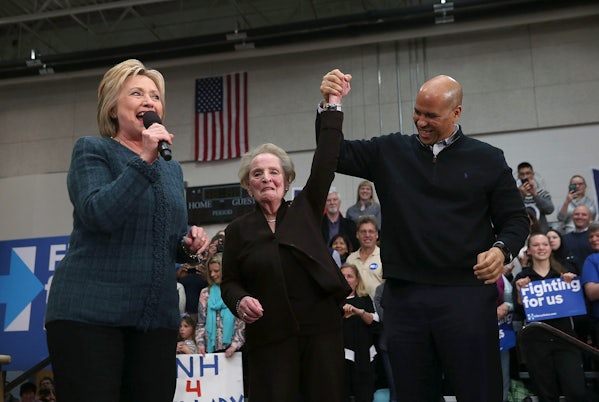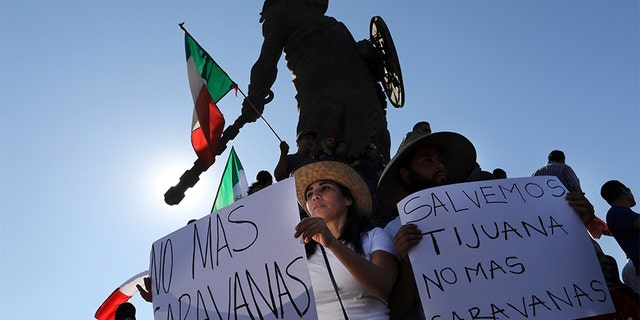 |
| Kamala Harris |
But that view never took hold among party activists. Liberal-leaning women were emboldened to talk about gender more, not less, after the 2016 election. We’ve had women’s marches and women running for office in greater numbers than ever — all while emphasizing their gender. President Trump’s moves kept identity issues at the forefront, too, and gave Democrats an opportunity both to defend groups they view as disadvantaged and to attack the policies of a president they hate.
The Democratic Party hasn’t simply maintained its liberalism on identity; the party is perhaps further to the left on those issues than it was even one or two years ago. Biden and Sanders are still viable presidential contenders. But in this environment, so is a woman who is the daughter of two immigrants (one from Jamaica and the other from India); who grew up in Oakland, graduated from Howard and rose through the political ranks of the most liberal of liberal bastions, San Francisco; who was just elected to the Senate in 2016 and, in that job, declared that “California represents the future” and pushed Democrats toward a government shutdown last year to defend undocumented immigrants; and who regularly invokes slavery in her stump speech. (“We are a nation of immigrants. Unless you are Native American or your people were kidnapped and placed on a slave ship, your people are immigrants.”)
Sen. Kamala Harris has not officially said she is running in 2020, but she hasn’t denied it, either, and she’s showing many of the signs of someone who is preparing for a run, including campaigning for her Democratic colleagues in key races and signing a deal to write a book. The Californian ranks low in polls of the potential Democratic 2020 field, and she doesn’t have the name recognition of other contenders. (Her first name is still widely mispronounced — it’s COM-ma-la.) But betting markets have her near the top, reflecting the view among political insiders that Harris could win the Democratic nomination with a coalition of well-educated whites and blacks, the way Obama did in 2008.
Whatever happens later, the rise of Harris and her viability for 2020 tell us something about American politics right now: We are in the midst of an intense partisan and ideological battle over culture and identity; the Democrats aren’t backing down or moving to the center on these issues; and politicians who want to lead in either party will probably have to take strong, clear stances on matters of gender and race.
An opportunity
Harris, who went from district attorney of San Francisco to attorney general of California, was a heavy favorite in her 2016 Senate race. But once elected, she was expected to become a virtually powerless freshman senator in Hillary Clinton’s Washington. In fact, she might have been only the second most important person in Washington from her family, since her younger sister, Maya, was a top Clinton policy adviser on the campaign and in line for a senior White House job.But Clinton’s loss created an opportunity for Harris. The Democrats had the normal leadership vacuum of a party without control of the White House but also a specific void of people who were well-versed in immigration issues and were willing to take the leftward stances on them that the party base wanted as Trump tried to push U.S. immigration policy right. Meanwhile, Biden and Sanders were not natural figures to defend Planned Parenthood when, as part of the repeal of Obamacare, the GOP sought to bar patients from using federal funds at the nonprofit’s clinics. African-American activists went from being deeply connected to the White House to basically shut out of it, as Trump had few blacks in his Cabinet or in top administration posts. And, electorally, while Sanders or Massachusetts Sen. Elizabeth Warren were obvious potential presidential candidates for the populist wing of the party that backed the Vermont senator in the 2016 Democratic primaries, the coalition of minorities and more establishment-oriented Democrats1 who had backed Clinton didn’t necessarily have an obvious standard-bearer, particularly with the uncertainty over Biden’s status as a candidate in 2020.
While veteran party leaders like Biden may have wanted the party to move to the center on identity issues, Democratic voters had moved decidedly to the left, a process that was happening under Obama but may be accelerating under Trump. For example, a rising number of Democrats say that racial discrimination is the main factor holding blacks back in American society, that immigration is good for America and that the country would be better off if more women were in office.


Harris has seized the opportunity. From attending the annual civil rights march in Selma to pushing legislation that would get rid of bail systems that rely on people putting up cash to be released from jail, she has seemed to try to lead on issues that disproportionately affect black Americans and to position herself as their potential presidential candidate. She was one of the earliest critics on Capitol Hill of the Trump administration’s aggressive immigration policies, and her push for a government shutdown over the Deferred Action for Childhood Arrivals program delighted party activists (even if the strategy ultimately failed). Harris was among the first Senate Democrats to call for Minnesota’s Al Franken to resign amid allegations that he groped several women, and she has been a strong defender of Planned Parenthood.
A different moment
You might be thinking, “Didn’t we just have a biracial person (who was often described as and embraced being a ‘black’ politician) who was fairly liberal on cultural issues as a major national political figure? Wasn’t he president of the United States?”Well, yes. But here’s the big difference: Obama didn’t emerge as a presidential candidate by highlighting his strong stands on these divisive, complicated cultural issues, as Harris is attempting to do. In fact, his rise was in large part because he implied that America was not as divided on those issues as it seemed — and that those divides were diminishing. The 2004 Democratic National Convention speech that launched him to the national stage seems, now that we are in the Trump era, almost crazily optimistic. (“There’s not a liberal America and a conservative America; there’s the United States of America,” he said back then. “There’s not a black America and white America and Latino America and Asian America; there’s the United States of America.”)
Whatever the reality of such statements, the political strategy behind them made sense: It’s hard to imagine that America a decade ago would have embraced a nonwhite politician who wasn’t downplaying cultural divides and emphasizing unity. Back then, someone regularly talking about his or her ancestors being kidnapped and enslaved probably had no chance at being elected president.
But 2018 is much different than 2004 or 2008 in terms of the national debate on identity issues. For example, compared with a decade ago, a much higher percentage of Americans, particularly Democrats, see racism as a major problem. Over the past decade, Americans went through the birther movement, shootings of African-Americans by police captured on video, Black Lives Matter protests, Trump’s racial and at times racist rhetoric and Clinton’s “basket of deplorables” remark. And it’s not just race — think about #MeToo, the legalization of gay marriage and new debates on the rights of people who are transgender.
Harris can’t take the Obama “Kumbaya” route to the White House — I’m not sure at this point that a white Democrat could, either. By the end of his term, Obama didn’t sound particularly hopeful about America getting beyond its cultural divides. Clinton spoke more directly about race and racism in 2016 compared with Obama in 2004 and 2008. Sanders and other white Democrats are already talking taking fairly liberal stances on these issues, and I expect that to continue into next year.
I’m not sure Harris had much choice anyway. She is a Democratic senator from heavily Latino California with Trump as president, so it’s a virtual job requirement for to her to take leftward stances on immigration issues. She is a minority woman at a time when minorities and women are trying to gain more power in national politics, particularly within the Democratic Party — and she is the only black female senator. In other words, Kamala Harris and Barack Obama are, of course, different people. But they also arrived on the national scene at much different political moments.
“When you speak truth, it can make people quite uncomfortable,” Harris told a group of Democratic activists earlier this year in a speech in Henderson, Nevada. “And for people like us who would like to leave the room with everyone feeling lovely, there’s sometimes a disincentive to speak truth.
“But this is a moment in time in which we must speak truth.”























